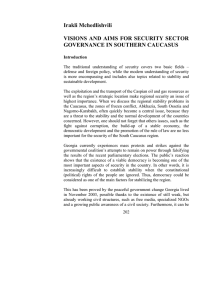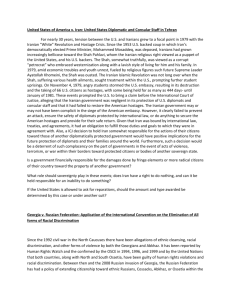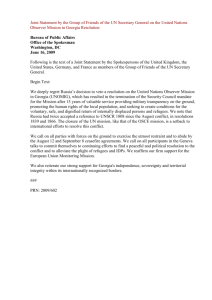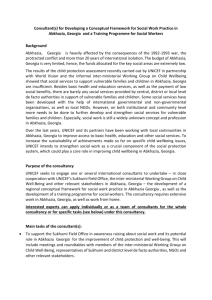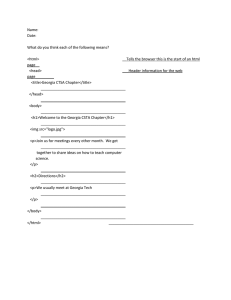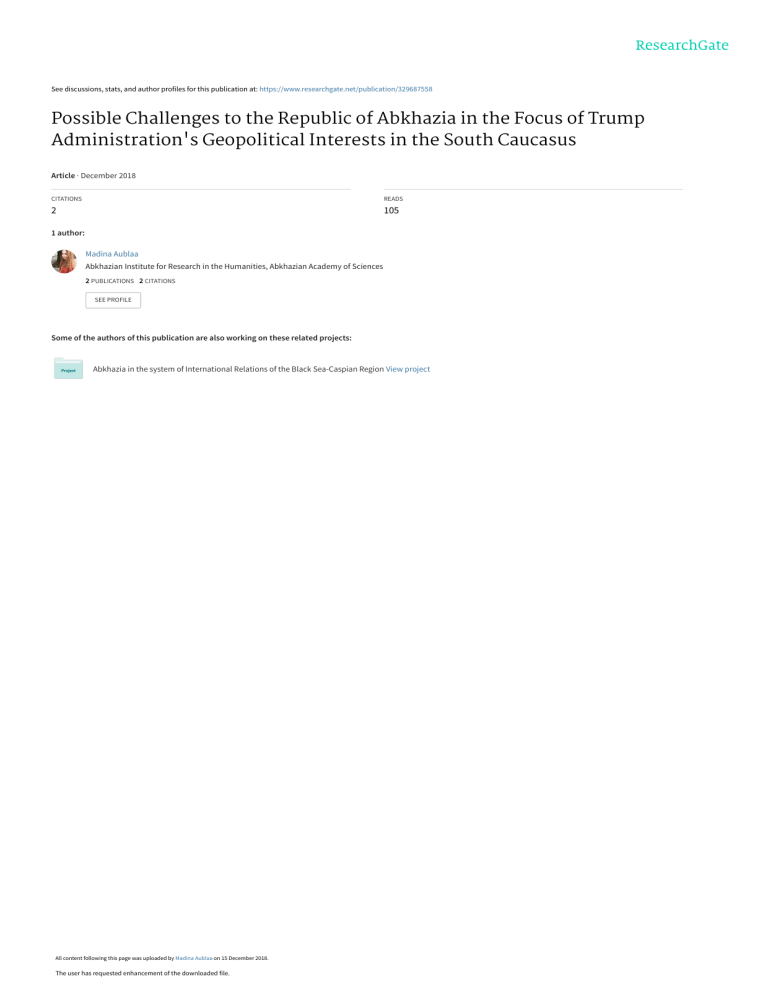
See discussions, stats, and author profiles for this publication at: https://www.researchgate.net/publication/329687558 Possible Challenges to the Republic of Abkhazia in the Focus of Trump Administration's Geopolitical Interests in the South Caucasus Article · December 2018 CITATIONS READS 2 105 1 author: Madina Aublaa Abkhazian Institute for Research in the Humanities, Abkhazian Academy of Sciences 2 PUBLICATIONS 2 CITATIONS SEE PROFILE Some of the authors of this publication are also working on these related projects: Abkhazia in the system of International Relations of the Black Sea-Caspian Region View project All content following this page was uploaded by Madina Aublaa on 15 December 2018. The user has requested enhancement of the downloaded file. Kafkasya Calışmaları - Sosyal Bilimler Dergisi / Journal of Caucasian Studies (JOCAS) Mayıs / May 2018, Yıl / Vol. 3, № 6 ISSN 2149–9527 E-ISSN 2149–9101 Possible Challenges to the Republic of Abkhazia in the Focus of Trump Administration’s Geopolitical Interests in the South Caucasus Madina Aublaa* Abstract The article reviews the foreign policy of the 45th US President Donald Trump in the South Caucasus. In the Consolidated Appropriations Act, signed in May 2017, which prohibits financial assistance to the states that recognized Abkhazia’s independence and established diplomatic relations with it, for the first time on the legislative level America declares Abkhazia an “occupied territory”. Since 2016, America has been strengthening military cooperation with Georgia, similar course is pursued during the presidency of Trump. These measures, as well as the growing escalation of the relations between the US and Iran, contribute to the destabilization of the situation in the South Caucasus in general and in Abkhazia in particular. Under Trump, the confrontation with Russia in the South Caucasus has become more aggressive. Such a situation can not but affect the interests and security of Abkhazia, which is part of the region. In this connection, this article attempts to trace possible challenges in the foreign policy course of US President Donald Trump to the Republic of Abkhazia. Keywords: Abkhazia, America, Georgia, Russia, Trump, Consolidated Appropriations Act, South Caucasus. Güney Kafkasya’da Trump Yönetiminin Jeopolitik Çıkarlarının Işığında Abhazya Cumhuriyeti’nin Yaşayacağı Muhtemel Zorluklar Özet Makale, 45. ABD Başkanı Donald Trump’ın Güney Kafkasya dış politikasını incelemektedir. Mayıs 2017’de imzalanan ve Abhazya’nın bağımsızlığını tanıyan ve onunla diplomatik ilişkiler kuran devletlere maddi yardımda bulunmayı yasaklayan Konsolide Tahsisatlar Yasası, ilk kez * Graduate Student, D. I. Gulia Abkhazian Institute for Research in the Humanities, Abkhazian Academy of Sciences; Republic of Abkhazia; aublaa.madina@mail.ru (Gönderim / Received: 04.04.2018; Yayın Kabul / Accepted: 17.06.2018) 307 Madina Aublaa Abhazya’yı “işgal altındaki topraklar” olarak yasama düzeyinde ilan etti. 2016 yılından bu yana ABD Gürcistan’la askeri işbirliğini güçlendiriyor ve Trump başkanlığında da benzer bir yol izlenmeye devam ediyor. Bu önlemler ve ABD ile İran arasında ilişkilerin gelişmesi de genel olarak Güney Kafkasya’da ve özellikle Abhazya’da durumun istikrarsızlaştırılmasına katkıda bulunuyor. Trump yönetimi altında Güney Kafkasya’da Rusya ile olan anlaşmazlıklar daha saldırgan hale geldi. Böyle bir durum, bölgenin bir parçası olan Abhazya’nın çıkarlarını ve güvenliğini etkileyecektir. Makale bu bağlamda ABD Başkanı Donald Trump’ın Abhazya Cumhuriyeti’ne yönelik dış politikasında olası zorlukları ve tehditleri izlemeye çalışmaktadır. Anahtar Kelimeler: Abhazya, Amerika, Gürcistan, Trump, Konsolide Tahsisat Yasası, Güney Kafkasya. The South Caucasus region is the epicenter of the clash of a large number of actors and their sometimes completely divergent interests. Among these actors today are almost all the leading world powers. This degree of interest drawn to the region is determined by the particularities of its geographical location, which has turned the South Caucasus into an important transboundary territory. Here are located: major gas and oil pipelines, air and sea ports, major international transport corridors. The disintegration of the Soviet Union and the collapse of the bipolar system drove the region into completely new historical realities and, at the same time, actualized the South Caucasus factor in the system of geopolitical, geostrategic and economic values of the West. However, special attention to the region increased two more times: after the war in South Ossetia in 2008 and the Crimean events in 2014. The Republic of Abkhazia is part of the South Caucasus. Undoubtedly, in addition to its internal problems, the government needs to respond to numerous external challenges, to build a strategy for ranking relations with a number of countries, both within the region and out of it. It is vitally important for such a small regional state as Abkhazia, to analyze the political situation around it. The analysis of events in this region emphasizes the high degree of their correlation with each other. A significant role is played here by nonregional actors, who consistently seek their own interests in the region. The following axiom becomes inevitable: the rules of the 308 Possible Challenges to The Republic of Abkhazia political game in the region today are largely set by such great powers as Russia and the USA. Initially, the Americans declared a policy of “soft power” through the implementation of the strategy of “engagement without recognition” and of the “strategic patience” policy in relation to Abkhazia. However, under Trump, the concept of “strategic patience” fades into the background due to the president’s actions to isolate Abkhazia from the external world agenda by exerting pressure on its strategic partners. However, before studying the foreign policy of such a small state as Abkhazia, and attempting to identify its place in the foreign policy course of the USA, it is necessary to find out what place is devoted to the case of small countries in the theory of international relations. In many respects such countries depend on the international political agenda and the nature of the relations between major powers. Sometimes small states become hostages to big politics, and often they have to seek assistance from super-powers. After the collapse of the USSR, new small states were formed in the territory of the South Caucasus. It is known that the disintegration caused the growth of conflict potential in the postSoviet countries, many of the conflicts are still not resolved, including the Georgian-Abkhaz conflict. Despite the fact that in theory of international relations, the case of small states is not well studied, there is a number of researchers who worked on this problem. These researchers are Spykman, Goldhammer, Rothstein, Neumann and Gstohl, Marleku, Baker, Dommen and Hein. According to the American researcher Nicholas Spykman (294-295), for example, a small state exists not because it is viable, but because no one wants its territory, or because its existence as a buffer state or a certain element in the system of balance of power, suits a strong country. As Thomas Frear shows in his article “The foreign policy options of a small unrecognised state: the case of Abkhazia” literature surrounding Abkhazian foreign policy often contains neo-realist view. For example, as Sufian Zhemukhov (1) states “Abkhazia’s status has not developed as the result of a consistent foreign policy but rather via a series of accidental international events unconnected to each 309 Madina Aublaa other”. The refutation of such an assessment of the foreign policy of the Republic of Abkhazia is beyond the scope of this study. The author of the article follows the approach that formed the basis of neo-realism and was put forward by Kenneth Waltz. As Waltz puts it the actions of states can often be explained by the pressure exerted on them by international rivalries, which limits and narrows their choices. According to Waltz, the theory of international relations is possible only at the level of studying the entire international system. In addition to those factors that were taken into account by classical political realism, the foreign policy of individual states is also determined by their place in the structure of the system of international relations. This structure itself is formed under the influence of the interaction of the strongest and largest states among themselves. Small states can not influence this structure, which becomes an external constraint for their foreign policy, so thus they need to be more attentive to it due to their “narrower margin for error” (Waltz 194-195). The main task of this article is to find the reasons that ensure the sovereign existence of such a small state as Abkhazia, as well as to trace possible challenges and threats in the foreign policy of US President Donald Trump for the Republic of Abkhazia. Foundations of American South Caucasus policy The USA first appeared in the region in 1997. During the second term of Bill Clinton’s presidency, the region was declared as a zone of America’s vital interests. In pursuing the goal of exercising control over Russia and its potential allies, maximizing proximity to the Middle East, and also to its strategic ally Israel, the United States started to develop a special policy course in the Balkans. After the events of September 11, 2001, the United States intensified the fight against “international terrorism” and in the spring of 2004 the “Great Middle East” project was developed. The US Armed Forces were increasingly approaching the borders of Russia. The US secured access to the Black Sea by concluding an agreement with Romania (December 2005) and Bulgaria (April 2006), deployed a contingent of military consultants to Georgia to advance to the Caspian, Central Asia and the Far East. An important component of the US actions in the region is its militarization, which is significantly strengthened 310 Possible Challenges to The Republic of Abkhazia after the 2008 war, the Crimean events of 2014, the war in Syria and Iraq. With the goal of eliminating dependence on eastern oil supplies, the US is increasing its presence in the Caspian. The South Caucasus has always played a key role for America as a reliable pillar on the way to Caspian oil, and as a convenient springboard not only in the case of an operation against Russia, but also against Iran. It should be noted that Russia is the main opponent and competitor of the United States in the region. Today the most “painful” points in relations between the US and Russia in the region are Crimea-Ukraine, Karabakh and Syria. Focusing on the US position on Abkhazia, it should be noted that America is pursuing a principled policy of non-recognition of the “separatist” Georgian territories and the withdrawal of the newly formed post-USSR countries of the South Caucasus from the sphere of Russian influence. The main strategic partner of the United States in the South Caucasus is Georgia. Since 1996, Georgia, reoriented towards Washington, had been pursuing the policy of squeezing the region out of Russia’s sphere of influence. However, this, in its time, led to the lifting of sanctions on Abkhazia and strengthening of Russia’s positions in the Republic, which became a kind of “buffer” zone between Russia and Georgia. Russia could not cede Abkhazia to the United States, because otherwise the US troops would be at the very border of Russia. Until 2008, an active struggle for influence in Abkhazia and South Ossetia was unfolding, ceasing with the recognition of their independence by Russia, which led to an even greater confrontation between Georgia and Russia. Both countries were caught up in a conflict, the resolution of which in the short term is difficult to predict. This factor plays into the hands of the United States, which is building a similar relationship with Azerbaijan. It can be stated that with the signing of the “Treaty on Alliance and Strategic Partnership” between Russia and Abkhazia on November 24, 2014, attempts by the Western countries to consolidate themselves in Abkhazia are hardly feasible. Abkhazia has firmly entered the sphere of influence of Russia, which is interested in the military and geostrategic potential of the country. Under Trump the confrontation with Russia in the South Caucasus has 311 Madina Aublaa become more aggressive. Such a situation can not but affect the interests and security of Abkhazia, which is part of the region. Key Points of Trump`s Foreign Policy In 2017, Donald Trump became the 45th president of the United States. This victory was unexpected for Americans. The leader came to power with loud promises to erect the Mexican Wall and to stop the policy of interference in the domestic political affairs of other countries. Summarizing the first year of Trump’s rule, the president’s low rating within the country should be noted. Negative attitude of Americans towards the Head of State was expressed in numerous mass demonstrations and protests. Regarding foreign policy, a number of measures taken by Trump are at odds with his pre-election promises of non-interference in the internal affairs of other states, among them: confrontation with North Korea, change of strategy in Afghanistan (according to Trump’s program, the American contingent must remain in Afghanistan, so as to avoid “filling the vacuum with terrorists” (Euronews)), a missile attack on Syria. In many respects, the policy of the American president leads to the isolation of the United States and the loss of its closest allies. As measures that create such a situation, we can note the attempts of Trump to break the nuclear deal with Iran, or the recognition of Jerusalem as the capital of Israel. This can lead to a reorientation of the Arab states, for which America will no longer be a reliable military-political guarantor. Regarding the South Caucasus, Trump conducts a more aggressive policy than his predecessor Barack Obama. An expert from the Atlantic Council, former OSCE Minsk Group Co-chair from the United States, former US Ambassador to Azerbaijan Matthew Bryza, says: “In his foreign policy, Trump does not pay much attention to the South Caucasus region, which he does not know much about. However, he did not oppose the decision of Congress to supply weapons to Georgia, which means that Secretary of State Rex Tillerson and other government officials are pursuing roughly the same policies that the Obama administration had been carrying out. In the beginning, Obama wanted to curtail the aggressive policy of his predecessor George W. Bush in the 312 Possible Challenges to The Republic of Abkhazia South Caucasus and reset relations with Russia, but later he moved closer to Georgia and strengthened US positions in the South Caucasus region, but Obama was not at all ready to sell arms to Tbilisi. Under American democracy, the US president must take into account the Congress. It turns out that Trump is forced to pursue a more aggressive policy than Obama, in which the issue of the sale of arms to Georgia and Ukraine was not even on the agenda of the White House” (Irevanaz). According to the American diplomat, Trump is forced to take such actions in order to avoid accusations of cooperation with Russia. This charge against the president is still being investigated in the Congress and the US Senate. In November 2018, midterm elections will be held in Congress, and in this connection, it is extremely necessary for the president to achieve the formation of his own coalition in the Congress, which will make it possible to implement his election plans. Measures concerning Abkhazia As mentioned above, the Congress has a significant influence on the position of the president. In 2017-2018 in the 115th US Congress Abkhazia is mentioned in 8 bills (Congress, S.722; S.1780; S.94; H.R.1751; S.1221; H.R.3354; H.R.3203; H.R.3362), 3 resolutions (Congress, S.Res.106; S.Res.100; H.Res.576) and 4 laws (Congress, H.R.244; H.R.3364; H.R.2810; H.R.1625). The first law according to the chronological order signed by Trump that mentions Abkhazia is the Law on the US budget for 2017, Consolidated Appropriations Act 2017 (Congress, H.R.244). On May 5, 2017, the law was approved by the US Congress, the Document entered into force on May 6. Abkhazia is mentioned in the following context: “(c) Occupation of the Georgian Territories of Abkhazia and Tskhinvali Region/South Ossetia. (1) None of the funds appropriated by this Act may be made available for assistance for the central government of a country that the Secretary of State determines and reports to the Committees on Appropriations has recognized the independence of, or has established diplomatic relations with, the Russian occupied Georgian territories of Abkhazia and Tskhinvali Region/South Ossetia: 313 Madina Aublaa Provided, That Scretary shall publish on the Department of State Web site a list of any such central governments in a timely manner: Provided further, That the Secretary may waive the restriction on assistance required by this paragraph if the Secretary determines and reports to the Committees on Appropriations that to do so is in the national interest of the United States, and includes a justification for such interest. (2) None of the funds appropriated by this Act may be made available to support the Russian occupation of the Georgian territories of Abkhazia and Tskhinvali Region/South Ossetia. (3) The Secretary of the Treasury shall instruct the United States executive directors of each international financial institution to vote against any assistance by such institution (including any loan, credit, or guarantee) for any program that violates the sovereignty and territorial integrity of Georgia. (4) Not later than 90 days after enactment of this Act, the Secretary of State shall submit to the appropriate congressional committees a report on actions taken by the Russian Federation to further consolidate the occupation of the Georgian territories of Abkhazia and Tskhinvali Region/South Ossetia, including the estimated annual costs of such occupation. (d) Assistance to Counter Influence and Aggression. (1) Of the funds appropriated by this Act under the headings “Assistance for Europe, Eurasia and Central Asia”, “International Narcotics Control and Law Enforcement”, and “Foreign Military Financing Program”, not less than $100,000,000 shall be made available for assistance to counter Russian influence and aggression in countries in Europe and Eurasia” (Congress, H.R.244). In the law Countering America’s Adversaries Through Sanctions Act, signed August 2, 2017 (Congress, H.R.3364) and in the law National Defense Authorization Act for Fiscal Year 2018, signed December 12, 2017 (Congress, H.R. 2810) the position of the Congress is as follows: “The Government of the Russian Federation continues to violate its commitments under the Memorandum on Security Assurances in connection with Ukraine’s Accession to the Treaty on the Non-Proliferation of Nuclear Weapons, done at Budapest December 5, 1994, and the Conference on Security and 314 Possible Challenges to The Republic of Abkhazia Cooperation in Europe Final Act, concluded at Helsinki August 1, 1975 (commonly referred to as the ‘Helsinki Final Act’), which laid the ground-work for the establishment of the Organization for Security and Cooperation in Europe, of which the Russian Federation is a member, by its illegal annexation of Crimea in 2014, its illegal occupation of South Ossetia and Abkhazia in Georgia in 2008, and its ongoing destabilizing activities in eastern Ukraine.” The Government of the Russian Federation continues to ignore the terms of the August 2008 ceasefire agreement relating to Georgia, which requires the withdrawal of Russian Federation troops, free access by humanitarian groups to the regions of South Ossetia and Abkhazia, and monitoring of the conflict areas by the European Union Monitoring Mission. The United States, consistent with the principle of ex injuria jusnon oritur, supports the policy known as the “‘Stimson Doctrine’ and thus does not recognize territorial changes effected by force, including the illegal invasions and occupations of Abkhazia, South Ossetia, Crimea, Eastern Ukraine, and Transnistria” (Congress, H.R.3364; H.R.2810). On March 23, 2018, Trump signed the Law on the US Budget for 2018, Consolidated Appropriations Act 2018 (Congress, H.R.1625), which preserves the position outlined in the previous Act of May 6, 2017. These documents are supported by the actions of the overseas authorities. Since 2016, cooperation between the United States and Georgia in the security sphere has increased significantly. Under the President Obama, in July 2016, a memorandum “On deepening cooperation in the field of defense and security between Georgia and the United States” was signed. In December 2016, Deputy Assistant Secretary of Defense Mike Carpenter together with the Minister of Defense of Georgia Levan Isoria signed a framework agreement in the field of security for 20162019, within which a military training center will be built at the former Russian military base in Vaziani by analogy with the Hohenfels base in Germany. On July 30-August 12, 2017 in Vaziani, within the framework of the “Noble Partner 2017” program, a multinational military exercise took place, involving 2,800 troops from 8 NATO member countries and partners: the United States, Great Britain, 315 Madina Aublaa Germany, Slovenia, Turkey, Ukraine, Armenia and Georgia (Ahmeteli). Avoiding accusations of provocation and threat to undermine the security of Russia and other countries of the region, Georgian Foreign Minister Mikheil Janelidze said: “These exercises are not aimed against anyone. The exercises are organized to increase our defense capability, which leads to greater stability and peace in the region” (Ahmeteli). A similar statement was made by the US Ambassador to Georgia Jan Kelly: “NATO exercises in Georgia are not directed against third countries, but are aimed at helping Georgia to increase the combat readiness of its own army” (Eadaily). Relations in the region have long been formed on the basis of the “challenge-response” principle, therefore it is not surprising that five days before the NATO exercises in Georgia, Russia was launching large-scale military training in the North Caucasus and South Ossetia, just 25 km from the capital of Georgia. In the Russian exercise took part 16 thousand troops and 4 thousand units of weapons and military equipment. On August 1, the exercise was visited by Vice President of America Mike Pence. August 8, Abkhazia, in its turn, is visited by the President of the Russian Federation V.V. Putin. On September 3-11, 2017, the regular multinational military GeorgiaNATO exercises “Agile spirit 2017”, with the participation of US marines, took place at the Orfolo shooting range (Akhaltsikhe region of Georgia). In March of the same year, negotiations were under way to establish a NATO Coast Guard base in the Georgian port of Poti (Tarasov). The US actively promotes the standardization of Georgia’s armed forces to NATO’s military parameters, today the issue of Georgia’s accession to the Alliance is actively lobbied by Lithuania. The US has long articulated this issue, however, now it has the following peculiarities. Former Georgian Defense Minister Tina Khidasheli noted: “After completing these exercises, Georgia will have the firstever certified Unit of the NATO Response Force - the first official Georgian Unit of NATO with NATO patches” (Panarmenian). As part of the exercises for the first time in this century the British military contingent appeared again in the South Caucasus. Explaining the geopolitical goals of the exercises, as well as the appearance of 316 Possible Challenges to The Republic of Abkhazia American tanks in the South Caucasus, the ex-commander of the US Army in Europe, General Ben Hodges, stated: “The main goal of these exercises is to check how quickly American military equipment and fighters can rush to the Caucasus if necessary” (Tarasov). As is known, to join NATO, Georgia has to resolve conflicts with Abkhazia and South Ossetia, whose independences are recognized by Russia, Nicaragua, Venezuela, Nauru and Syria. In May 2017 Trump signed Consolidated Appropriations Act, and the fact that in this law Abkhazia and South Ossetia were for the first time officially declared at the legislative level as “occupied territories” and that this document forbids the provision of financial support to the countries that recognized their independence can be well regarded as a measure of political pressure on these countries. Previously, with respect to Abkhazia, America used the terms “Georgian region of Abkhazia”, “breakaway region”, and from 2015 “occupied territory of Abkhazia”, but only in bills and resolutions that do not have such binding character as a law. This measure, together with the subsequent meeting of Georgian Prime Minister Giorgi Kvirikashvili with the US President Donald Trump and vice-president Mike Pence on May 8 in Washington, caused, undoubtedly, positive reaction in the government of Georgia. In particular, the Georgian government expressed confidence that the current president has finally withdrawn from the course of his more democratic predecessor and will now continue the policy that was once started by George W. Bush. Possible challenges to the sovereign status of Abkhazia There is a threat of a marked decrease in the degree of relations between America and Iran with the advent of Trump to power. In our view, the intensification of military cooperation with Georgia is the preparation by the United States for an accelerated reaction to a possible escalation of relations with Iran. Undoubtedly, this creates a threat to the security of Abkhazia. The buildup of the US military presence as a whole complicates the situation in the South Caucasus, at least due to its geographical proximity. It is possible that, as a condition for using its own territory as a springboard for advancement to Iran, Georgia may require America to provide military assistance for the restoration of its own territorial integrity. 317 Madina Aublaa The NATO Armed Forces in Georgia will be located in close proximity to Abkhazia, namely, the base of Orfolo, located 301 km from the Georgian-Abkhaz border, and the NATO Coast Guard in Poti. However, a number of measures taken by Trump can hardly be regarded as contributing to the restoration of the territorial integrity of Georgia. In the framework of his pre-election promise of America’s noninterference in the internal affairs of other states, Trump intended to reduce the financing of the State Department by acting on the principle of “more defense - less diplomacy”. And, indeed, in the US state budget for 2018, the cost of international assistance was reduced by 28.5%. The expenditures planned for Georgia amounted to $ 34.1 million. For comparison, in 2017, the US allocated to Georgia $ 100.33 million. According to the new budget, Georgia’s financing under the “Peace and Security” program of $ 30 million will be completely canceled; under the program “Governing Justly and Democratically” - the main US mechanism for promoting democracy in Georgia - will be reduced by almost $ 10 million (Larsen). The question arises: under new conditions, with cuts in the State Department budget and cuts in Georgia’s funding, how effectively will the US be able to guarantee the sovereignty and territorial integrity of Georgia, as well as its accession to NATO? Against the backdrop of positive comments by the Foreign Minister, Prime Minister and other officials of Georgia, as well as numerous Georgian Media, in connection with the Act signed in May, an article published on the website of the Georgian informationalanalytical agency SAQINFORM under the heading “No cent for Nicaragua, Venezuela and Nauru! - Why Trump submitted the budget in which Georgia is called occupied” draws much attention. One of the reasons given by the agency in this article is that this measure is another “PR move” by Trump, accused of sympathizing with Russia. As a confirmation of the possible fairness of the above-mentioned argument, we will mark the following facts: 1. One of the first measures adopted by Trump as the president was the decree on the US withdrawal from the Trans-Pacific partnership (this measure largely opened the way for Russia to Asia); 2. As mentioned above, in mid-2017, the president reduced the US State Department budget 318 Possible Challenges to The Republic of Abkhazia and this is the second step that can be regarded as a positive factor for Russia (the weakly financed State Department will allow Russia to strengthen its foreign policy and fill the “vacuum”). Another reason given in this article is that the United States has never financed countries that recognized the independence of Abkhazia and South Ossetia. In our opinion, this conclusion is ill-founded. The USA did provide financial assistance to these states, which is easily confirmed by the data provided by USAID, the main US mechanism for international assistance. At the same time, the cessation of financial flows to these countries from America can not lead to the possible recall of recognition of Abkhazia’s independence by these countries due to their close ties with Russia, which represents the interests of the Republic of Abkhazia on the International arena. Conclusion On the basis of the above discussed data as the example of Abkhazia shows, small states in the current century, have shown extraordinary vitality and ability to survive under extreme conditions of the international environment. The main reasons that ensure the sovereign existence of such states are not only and not so much the norms of international law as the geographical and political characteristics of them. Often, small states are geographically located in strategically important places, which makes possible their existence and inclusion in the foreign policy agenda of major powers. Thus, it means that super-powers have to reckon with smaller ones in making foreign policy decisions. The study once again underlines the dependence of the Republic of Abkhazia on the political will of super powers (namely Russia and USA), which may well negatively effect its future, as is pointed out by Nicholas Spykman. In this regard, Abkhazia needs to focus on building a more mature and possibly independent foreign policy course. Evaluating the policy of Trump and the American government with respect to Abkhazia, we come to the conclusion that this policy consists: in the continuity of Trump`s political predecessors` position based on the principle of non-recognition of Abkhazia’s independence, though with the remark, that under the current president it has become more aggressive; in the recognition of Abkhazia as an “occupied territory”; in decreasing Russia’s influence 319 Madina Aublaa in the Republic; in exerting pressure on the diplomatic partners of Abkhazia, as well as in facilitating the further non-recognition of the Republic of Abkhazia by other states. However, for a number of reasons, the measures taken by the President of America, in our opinion, are unlikely to lead to the loss of the current independent status of the Republic of Abkhazia. At the same time, there remains the possibility of destabilization in the country’s security issues. References Agreement between the United States of America and Romania regarding the activities of United States Forces located on the territory of Romania. 06/12/2005. Available at: https://www.state.gov/documents/organization /75826.pdf Agreement between the Government of the United States of America and the Government of the Republic of Bulgaria on defense cooperation. 28/04/2006. Available at: https://www.state.gov/documents/organization /70921.pdf Ahmeteli, Nina. “V Gruzii startovali uchenija s uchastiem vojsk NATO i Ukrainy”, [“The exercises with participation of NATO and Ukraine troops started in Georgia”]. BBC. Available at: https://www.bbc.com/russian/news40771126 (Accessed 03 April 2018). Baker, Gordon. No Island is an Island: The Impact of Globalization on the Commonwealth Caribbean. London: Chatham House. 2007. Congress, “H.R.576 - Reaffirming the strategic partnership between the United States of America and the country of Georgia”. Available at: https://www.congress.gov/bill/115th-congress/house-resolution/576 (Accessed 03 April 2018). Congress, “H.R.1625 - Consolidated Appropriations Act, 2018”. Available at: https://www.congress.gov/bill/115th-congress/house-bill/1625 (Accessed 03 April 2018). Congress, “H.R.1751 - Counteracting Russian Hostilities Act of 2017”. Available at: https://www.congress.gov/bill/115th-congress/house-bill/1751 (Accessed 03 April 2018). Congress, “H.R.244 - Consolidated Appropriations Act, 2017”. Available at: https://www.congress.gov/bill/115th-congress/house-bill/244 (Accessed 03 April 2018). 320 Possible Challenges to The Republic of Abkhazia Congress, “H.R.2810 - National Defense Authorization Act for Fiscal Year 2018”. Available at: https://www.congress.gov/bill/115th-congress/housebill/2810 (Accessed 03 April 2018). Congress, “H.R.3203 - Countering Iran’s Destabilizing Activities Act of 2017”. Available at: https://www.congress.gov/bill/115th-congress/housebill/3203 (Accessed 03 April 2018). Congress, “H.R.3354 - Interior and Environment, Agriculture and Rural Development, Commerce, Justice, Science, Financial Services and General Government, Homeland Security, Labor, Health and Human Services, Education, State and Foreign Operations, Transportation, Housing and Urban Development, Defense, Military Construction and Veterans Affairs, Legislative Branch, and Energy and Water Development Appropriations Act, 2018”. Available at: https://www.congress.gov/bill/115th-congress/housebill/3354 (Accessed 03 April 2018). Congress, “H.R.3362 - Department of State, Foreign Operations, and Related Programs Appropriations Act, 2018”. Available at: https://www.congress.gov/bill/115th-congress/house-bill/3362 (Accessed 03 April 2018). Congress, “H.R.3364 - Countering America’s Adversaries Through Sanctions Act”. Available at: https://www.congress.gov/bill/115thcongress/house-bill/3364 (Accessed 03 April 2018). Congress, “S.1221 - Countering Russian Influence in Europe and Eurasia Act of 2017”. Available at: https://www.congress.gov/bill/115thcongress/senate-bill/1221 (Accessed 03 April 2018). Congress, “S.1780 - Department of State, Foreign Operations, and Related Programs Appropriations Act, 2018”. Available at: https://www.congress.gov/bill/115th-congress/senate-bill/1780 (Accessed 03 April 2018). Congress, “S.722 - Countering Iran’s Destabilizing Activities Act of 2017”. Available at: https://www.congress.gov/bill/115th-congress/senate-bill/722 (Accessed 03 April 2018). Congress, “S.94 - Counteracting Russian Hostilities Act of 2017”. Available at: https://www.congress.gov/bill/115th-congress/senate-bill/94 (Accessed 03 April 2018). Congress, “S.R.106 - A resolution expressing the sense of the Senate to support the territorial integrity of Georgia”. Available at: https://www.congress.gov/bill/115th-congress/senate-resolution/106 (Accessed 03 April 2018). 321 Madina Aublaa Congress, “S.R.100 - A resolution condemning illegal Russian aggression in Ukraine on the three year anniversary of the annexation of Crimea”. Available at: https://www.congress.gov/bill/115th-congress/senateresolution/100 (Accessed 03 April 2018). Dommen, Edward and Philippe Hein. States, Microstates and Islands. London: Croom Helm. 1985. Eadaily. “Posol ssha: ucheniya NATO v Gruzii ne napravleny protiv tretih stran”, [“US Ambassador: NATO exercises in Georgia are not directed against third countries”]. Eadaily. Available at: https://eadaily.com/ru/news /2017/07/31/posol-ssha-ucheniya-nato-v-gruzii-ne-napravleny-protiv-tretihstran (Accessed 03 April 2018). Euronews “T,ramp ne vypustit amerikancev iz Afganistana”, [“Trump will not release Americans from Afghanistan”]. Available at: http://ru.euronews.com/2017/08/22/trump-afganistan-strategy (Accessed 03 April 2018). Frear, Thomas. The foreign policy options of a small unrecognised state: the case of Abkhazia, Caucasus Survey. 2014. Available at: https://doi.org/10.1080/23761199.2014.11417293 Goldhammer, Herbert. The Foreign Powers in Latin America. Princeton: Princeton University Press. 1972. Irevanaz. “Mjet’ju Brajza: “Tramp nedoocenil Gruziju i Azerbajdzhan”“ [“Matthew Bryza: “Trump underestimated Georgia and Azerbaijan”“]. Available at: http://irevanaz.com/rus/index.php?newsid=4284 (Accessed 03 April 2018). Larsen, Joseph. “What Has The United States Done for Georgia Lately?”. Georgian Institute of Politics. Available at: http://gip.ge/united-states-donegeorgia-lately/ (Accessed 03 April 2018). Marleku, Alfred. Small State Foreign Policy: The Case of Kosovo. Mediterranean Journal of Social Sciences (2013) 4 (2), 287-300. Neumann, Iver and Sieglinde Gstohl. Lilliputians in Gulliver`s World? Small States in International Relations. Centre for Small State Studies Publication Series. Reykjavik: University of Iceland, Working Paper 1. 2004. Panarmenian, “Odno iz podrazdelenij gruzinskoj armii stanet uchastnikom sil reagirovanija NATO”, [“One of the Units of the Georgian army will become a member of the NATO Response Force”]. Available at: http://www.panarmenian.net/rus/news/212103/ (Accessed 03 April 2018). 322 Possible Challenges to The Republic of Abkhazia Rothstein, Robert. Alliances and Small Powers. New York: Columbia University Press. 1968. SAQINFORM. “Ni centa Nikaragua, Venesujele i Nauru! - pochemu Tramp podpisal bjudzhet, v kotorom Gruzija upominaetsja okkupirovannoj”, [“No cent for Nicaragua, Venezuela and Nauru! - Why Trump submitted the budget in whuch Georgia is called occupied”].. Available at: http://ru.gruzinform.ge/news/31820/ni-centa-nikargua-venesuEle-i-nauru--poCemu-tramp-podpisal-bUdZet-v-kotorom-gruziA-upominaetsAokkupirovannoj-gruzinform-.html (Accessed 03 April 2018). Spykman, Nicholas .J., The Small States in International Politics and Organization, The Journal of Politics, 26, 1964. Tarasov, Stanislav. “Gruzija namerena sohranit’ status-kvo v Zakavkaz’e”, [“Georgia intends to maintain the status-quo in the Caucasus”]. REGNUM. Available at: https://regnum.ru/news/2132084.html (Accessed 03 April 2018). USAID, U.S. Foreign Aid by Country. https://explorer.usaid.gov/cd (Accessed 03 April 2018). Available at: Waltz, Kenneth N., Theory Of International Politics. Waveland Press, 2010. Zhemukhov, Sufian, Recognition without Independence: Abkhazia’s International Context. PONARS Eurasian Policy Memo No.245, 2012. 323 Madina Aublaa 324 View publication stats
